Shenzhen Wesort Optoelectronics Co., Ltd.
Address:Building 29, Longwangmiao Industrial Zone, Fuyong street, Bao'an District, Shenzhen, Guangdong Province, China.
Phone:+86 181 2370 6862
Coffee processing is a complex and meticulous task that involves several stages to transform raw coffee cherries into the high-quality beans we enjoy in our morning brew. One crucial step in this process is the sorting of coffee beans based on their color, and this is where the WESORT Color Sorter comes into play.
The primary function of a color sorter is to separate coffee beans based on their color and optical properties. This technology utilizes high-resolution cameras, advanced algorithms, and precision ejection systems to achieve accurate and efficient sorting. Here are some key aspects of how color sorters enhance the coffee processing process:
Removal of Defective Beans: Defective beans can negatively impact the taste and aroma of the final coffee product. Color sorters can detect and remove beans with defects such as insect damage, mold, discoloration, and size variations. By eliminating these defective beans, the quality and consistency of the coffee are greatly improved.
Foreign Material Removal: Coffee beans can sometimes be contaminated with foreign materials like stones, twigs, husks, and other debris. These impurities can introduce off-flavors and pose a safety risk to consumers. Color sorters are equipped with advanced sensor technology that can identify and remove foreign materials, ensuring that only pure coffee beans proceed to the next processing stage.
Consistency in Color Grading: Coffee beans come in various colors and shades, depending on the variety and degree of roasting. Color sorting machines can accurately grade coffee beans according to their desired color specifications, ensuring consistency in the final product. This is particularly important for specialty coffees where uniformity in appearance is highly valued.

This coffee color sorter capacity around 500-1000kgs/h which is cost-effective and suitable for coffee bean farmers and coffee shop,can sort discolured coffee beans and foreign materials from the good ones.The sorting machine is suitable for robusta coffee bean,arabic coffee bean ,green coffee et .We have built a full range of color sorters for the processing of whole coffee beans.
Product Description
To elevate the quality and efficiency of coffee bean processing, WESORT coffee bean sorting machine is designed meticulously sort both green and roasted coffee beans. By harnessing advanced visible light technology, our coffee bean sorter identifies and separates beans based on color difference, ensuring that only the finest, defect-free coffee beans make it to your final product. Say goodbye to manual sorting challenges and hello to consistently superior coffee bean quality with our coffee bean color sorter.
Product Features
✅High sorting accuracy to remove typical colour defects;
✅Reliable Performance in Demanding Environments: It consistently delivers top-tier performance, even in the tough coffee mill setting.
✅With 1 to 10 chutes available, WESORT optical sorters cater to various production needs and multiple sorting passes.
✅Operators can adjust the separation parameters according to the frequency and importance of the defects to be assessed and eliminated.
Increased Efficiency: Traditional methods of manual sorting are time-consuming and labor-intensive, which can lead to human errors and inconsistency. Color sorters automate the sorting process, significantly increasing efficiency and throughput. This allows coffee processors to handle larger volumes of beans in a shorter time, meeting the demands of the market.
Data Analysis and Quality Monitoring: Modern color sorting machines are equipped with data-processing capabilities that provide real-time monitoring and analysis. This enables coffee processors to track and measure various parameters such as defects, purity levels, and sorting efficiency. By analyzing this data, necessary adjustments and improvements can be made to optimize the coffee processing workflow.
In conclusion, Color sorters have transformed the coffee processing industry by offering advanced capabilities to detect and eliminate impurities, defects, and foreign materials. By optimizing sorting efficiency and enhancing product quality, these machines contribute to food safety, reduce waste, and uphold consumer trust. As technology continues to advance, color sorting machines will play a more important role in the coffee industry in the future, further improving our ability to provide safe, high-quality and full-flavored coffee products.
Coffee processing is a complex and meticulous task that involves several stages to transform raw coffee cherries into the high-quality beans we enjoy in our morning brew. One crucial step in this process is the sorting of coffee beans based on their color, and this is where the WESORT Color Sorter comes into play.
The primary function of a color sorter is to separate coffee beans based on their color and optical properties. This technology utilizes high-resolution cameras, advanced algorithms, and precision ejection systems to achieve accurate and efficient sorting. Here are some key aspects of how color sorters enhance the coffee processing process:
Removal of Defective Beans: Defective beans can negatively impact the taste and aroma of the final coffee product. Color sorters can detect and remove beans with defects such as insect damage, mold, discoloration, and size variations. By eliminating these defective beans, the quality and consistency of the coffee are greatly improved.
Foreign Material Removal: Coffee beans can sometimes be contaminated with foreign materials like stones, twigs, husks, and other debris. These impurities can introduce off-flavors and pose a safety risk to consumers. Color sorters are equipped with advanced sensor technology that can identify and remove foreign materials, ensuring that only pure coffee beans proceed to the next processing stage.
Consistency in Color Grading: Coffee beans come in various colors and shades, depending on the variety and degree of roasting. Color sorting machines can accurately grade coffee beans according to their desired color specifications, ensuring consistency in the final product. This is particularly important for specialty coffees where uniformity in appearance is highly valued.

This coffee color sorter capacity around 500-1000kgs/h which is cost-effective and suitable for coffee bean farmers and coffee shop,can sort discolured coffee beans and foreign materials from the good ones.The sorting machine is suitable for robusta coffee bean,arabic coffee bean ,green coffee et .We have built a full range of color sorters for the processing of whole coffee beans.
Product Description
To elevate the quality and efficiency of coffee bean processing, WESORT coffee bean sorting machine is designed meticulously sort both green and roasted coffee beans. By harnessing advanced visible light technology, our coffee bean sorter identifies and separates beans based on color difference, ensuring that only the finest, defect-free coffee beans make it to your final product. Say goodbye to manual sorting challenges and hello to consistently superior coffee bean quality with our coffee bean color sorter.
Product Features
✅High sorting accuracy to remove typical colour defects;
✅Reliable Performance in Demanding Environments: It consistently delivers top-tier performance, even in the tough coffee mill setting.
✅With 1 to 10 chutes available, WESORT optical sorters cater to various production needs and multiple sorting passes.
✅Operators can adjust the separation parameters according to the frequency and importance of the defects to be assessed and eliminated.
Increased Efficiency: Traditional methods of manual sorting are time-consuming and labor-intensive, which can lead to human errors and inconsistency. Color sorters automate the sorting process, significantly increasing efficiency and throughput. This allows coffee processors to handle larger volumes of beans in a shorter time, meeting the demands of the market.
Data Analysis and Quality Monitoring: Modern color sorting machines are equipped with data-processing capabilities that provide real-time monitoring and analysis. This enables coffee processors to track and measure various parameters such as defects, purity levels, and sorting efficiency. By analyzing this data, necessary adjustments and improvements can be made to optimize the coffee processing workflow.
In conclusion, Color sorters have transformed the coffee processing industry by offering advanced capabilities to detect and eliminate impurities, defects, and foreign materials. By optimizing sorting efficiency and enhancing product quality, these machines contribute to food safety, reduce waste, and uphold consumer trust. As technology continues to advance, color sorting machines will play a more important role in the coffee industry in the future, further improving our ability to provide safe, high-quality and full-flavored coffee products.

In modern agriculture, food processing, and recycling, quality control plays a vital role. This is where an optical sorter comes in. Many buyers often ask: What is an optical sorter? What does it do? How much does it cost? And how is WESORT optical...
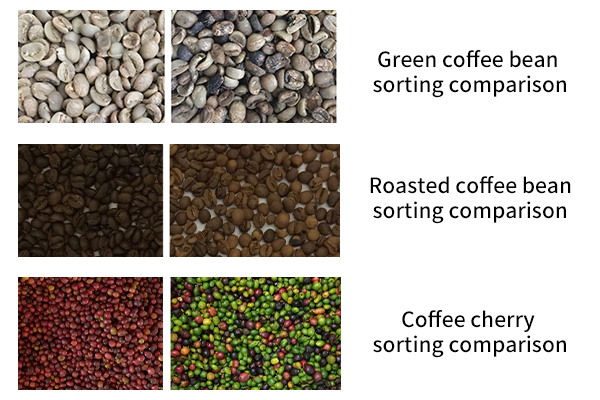
In the coffee industry, the quality of the final cup often depends on the smallest details during processing. One crucial step is removing defective beans, foreign materials, and color inconsistencies. This is where a coffee bean color sorter plays...

Coffee processing is a complex and meticulous task that involves several stages to transform raw coffee cherries into the high-quality beans we enjoy in our morning brew. One crucial step in this process is the sorting of coffee beans based on thei...

In the world of walnut processing, even the smallest imperfection can significantly impact product quality, market price, and brand reputation. Mold, insect damage, broken pieces, or inconsistent color are common defects that reduce the value of wa...
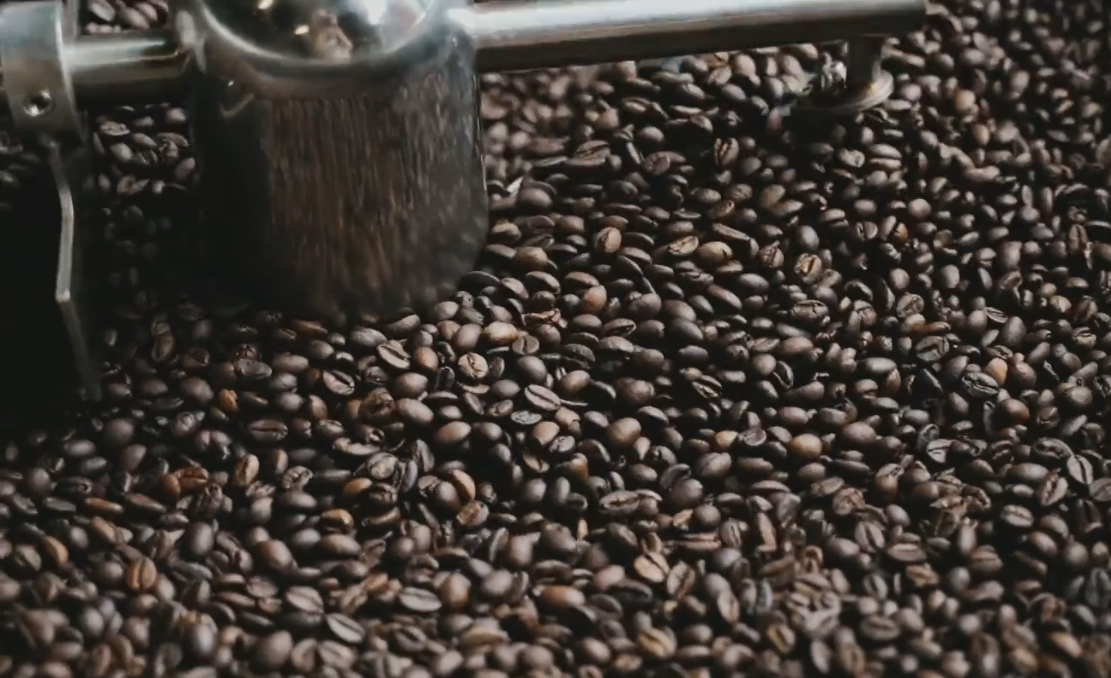
From green bean exporters to specialty coffee roasters, every producer faces the same challenge: how to remove defects efficiently while protecting valuable beans. Problems such as mold, fermentation damage, insect bites, black beans, broken beans,...
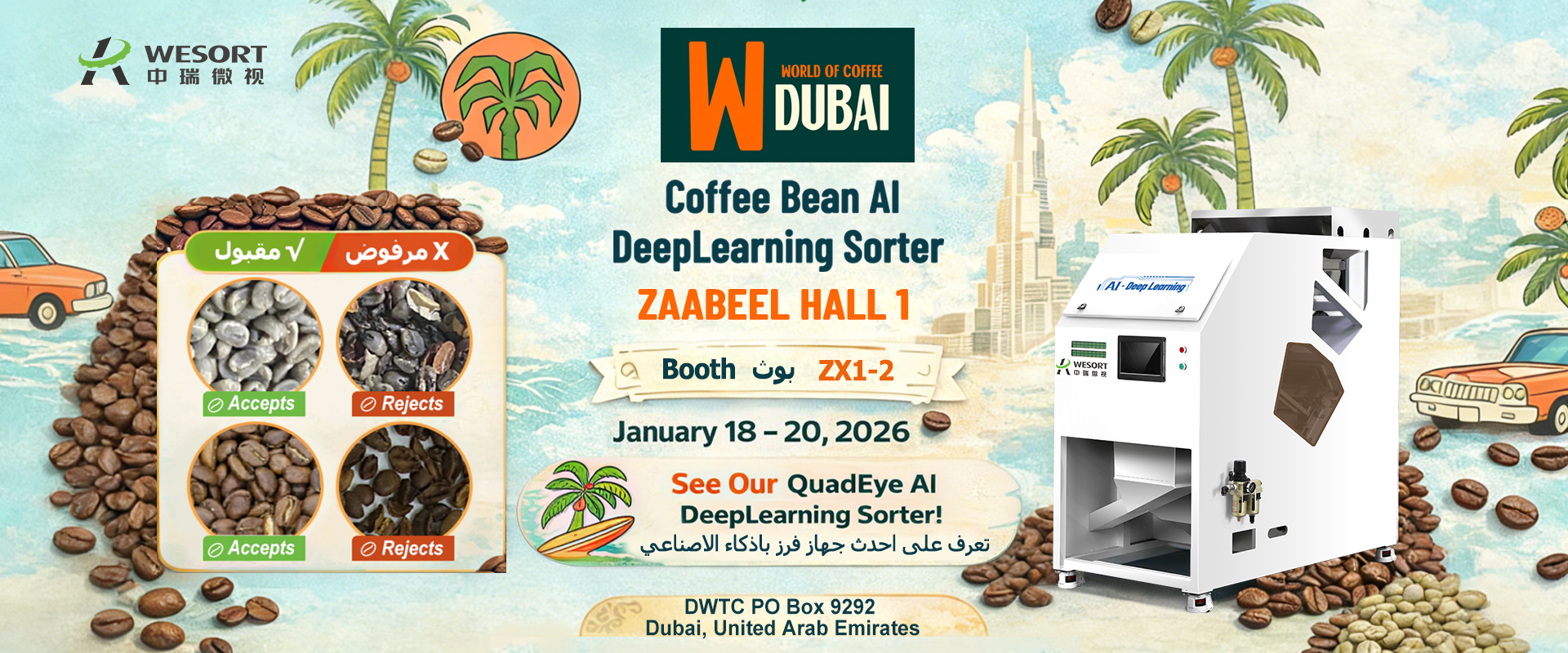
To meet the growing demand for premium and specialty coffee, sorting accuracy must go beyond traditional color-based systems. The QuadEye 360 AI Coffee Bean Sorter, developed by WESORT, represents the next generation of intelligent coffee bean so...

Dear friend, If you are attending World of Coffee Dubai 2026. we would like to invite you to visit WESORT. We will showcase our QuadEye 360 AI Coffee Bean Sorter, featuring 360° four-side inspection, AI deep learning models, near-zero breakage,...

Meta Description: Looking for the top hazelnut sorting machine manufacturer? WESORT offers advanced hazelnut color sorters with AI deep learning to efficiently remove defects, pests, and foreign materials. Boost your hazelnut processing efficienc...
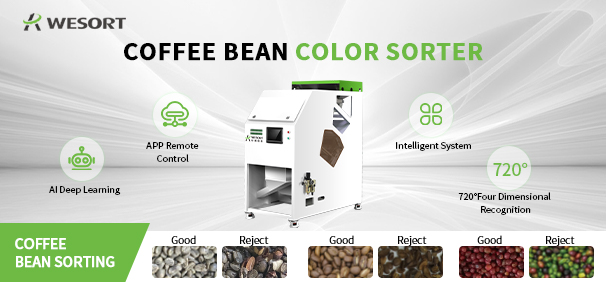
With the growing popularity of specialty coffee, the purity of coffee beans determines the aroma and taste of a cup of coffee. Achieving 99.9% purity requires high-performance coffee bean sorting equipment. Among Chinese coffee bean color sorter ma...
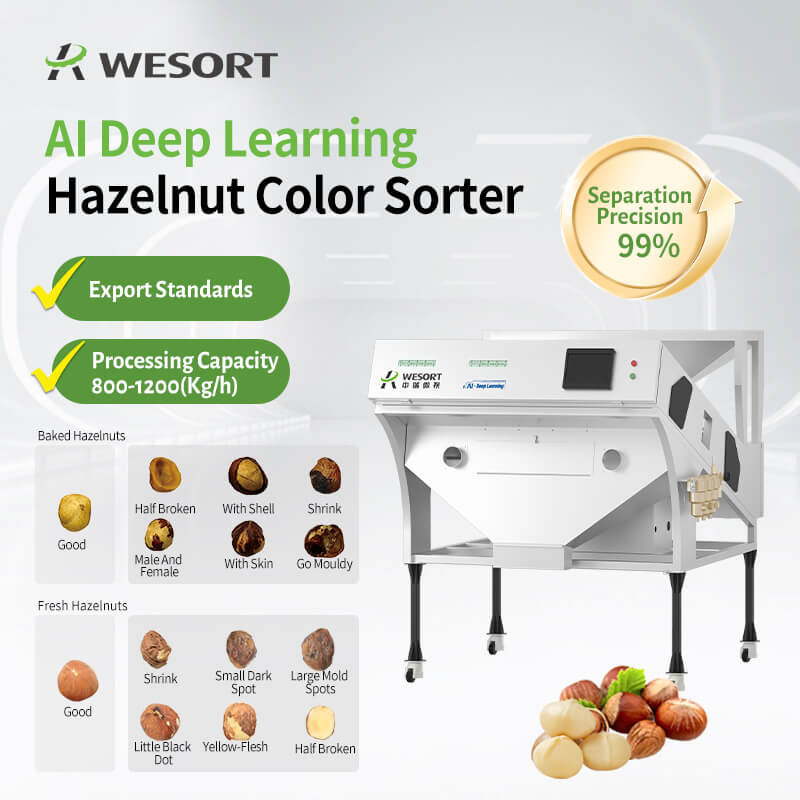
What's the most vexing issue in the hazelnut industry chain? It's not yield, but quality. Defects like mold, wrinkled skin, and foreign matter not only reduce product value but can also put export orders at risk. The solution isn't to increase the ...
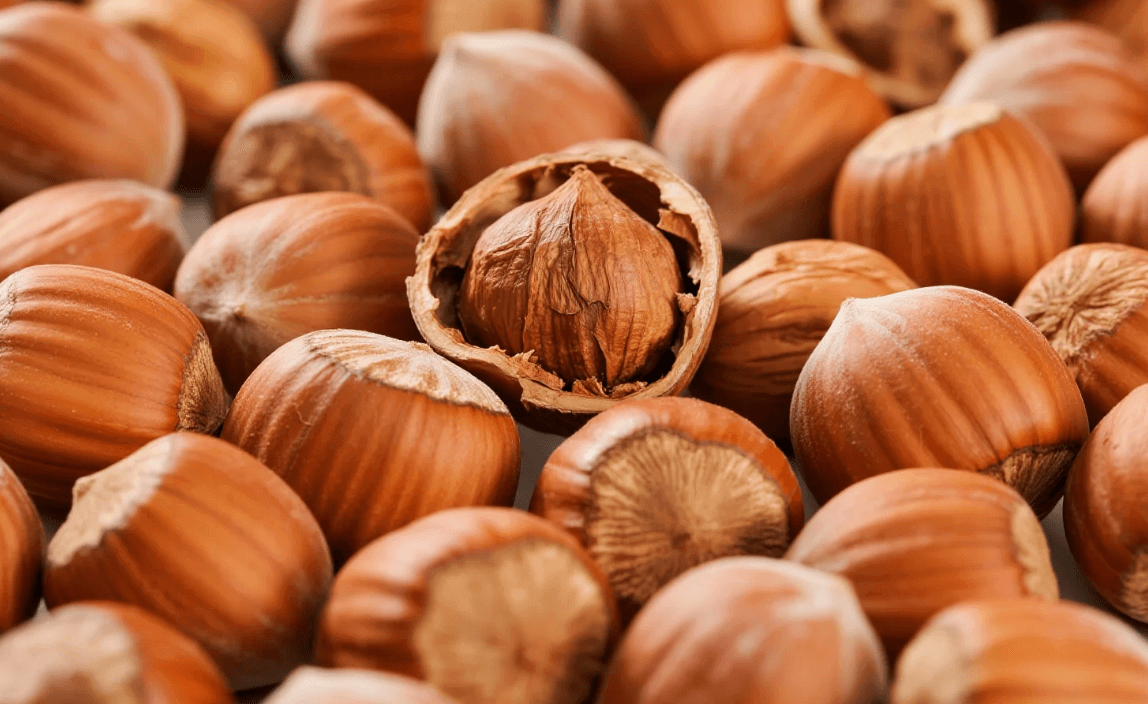
Every hazelnut tells a story—about the soil it grew in, the care during harvest, and the precision of its processing. Yet between farm and final product, hidden defects like mold, insect damage, and discoloration can turn premium hazelnuts into cos...

Plastic waste recycling is one of the most pressing challenges in today’s sustainability-driven world. Proper plastic sorting ensures high-quality recycled materials, reduces environmental impact, and improves profitability for recycling businesses...
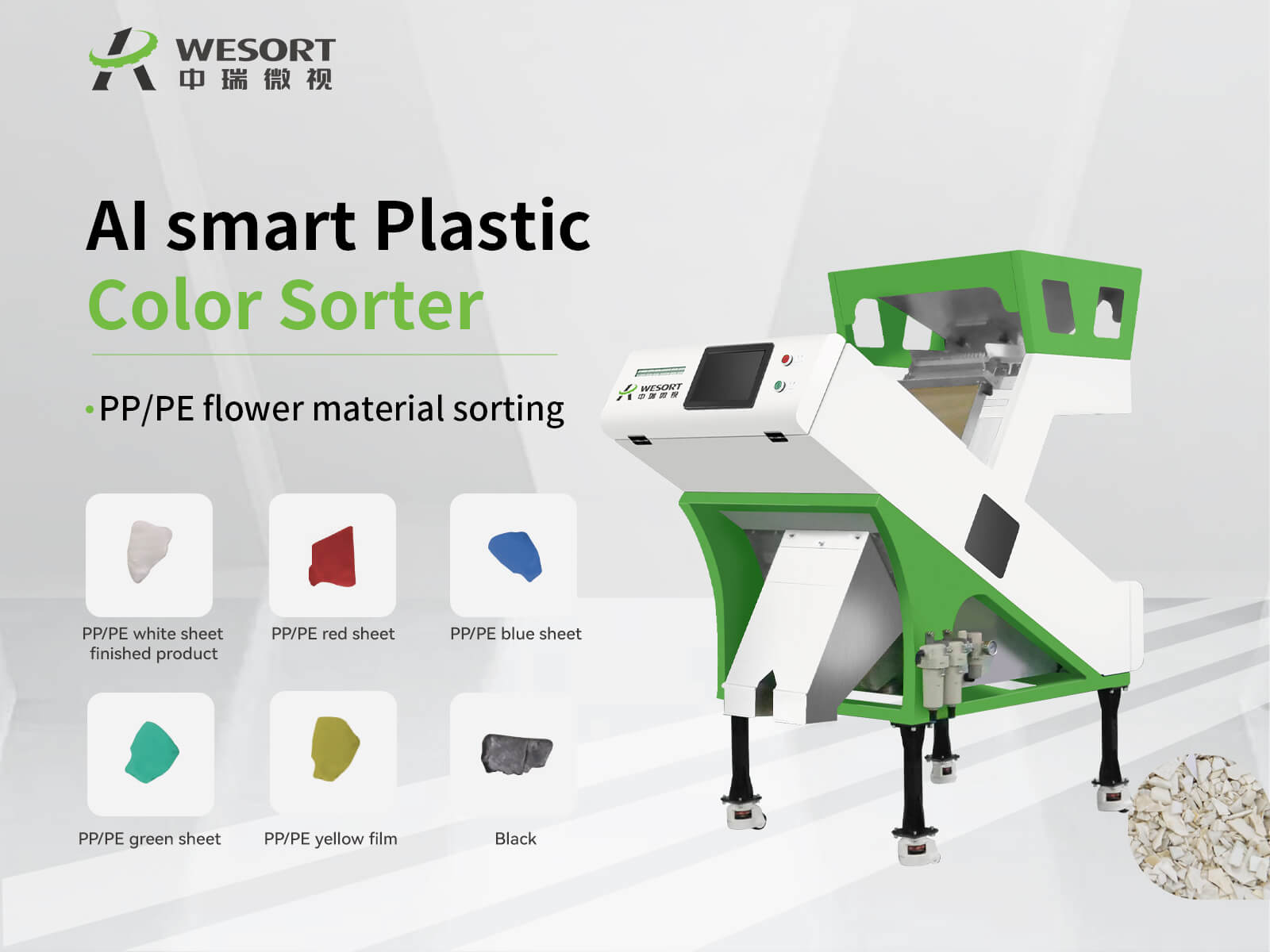
In the plastic recycling industry, purity and efficiency directly determine profitability. As global demand for recycled plastics increases, manufacturers need advanced solutions to separate impurities, improve yield, and ensure consistent product ...

In Mexico, coffee is more than just a drink — it’s a culture, a tradition, and a vital industry. Yet, challenges like impurities, pest damage, and uneven coloration often diminish the value of even the most carefully cultivated beans. At EXPO CAFÉ...
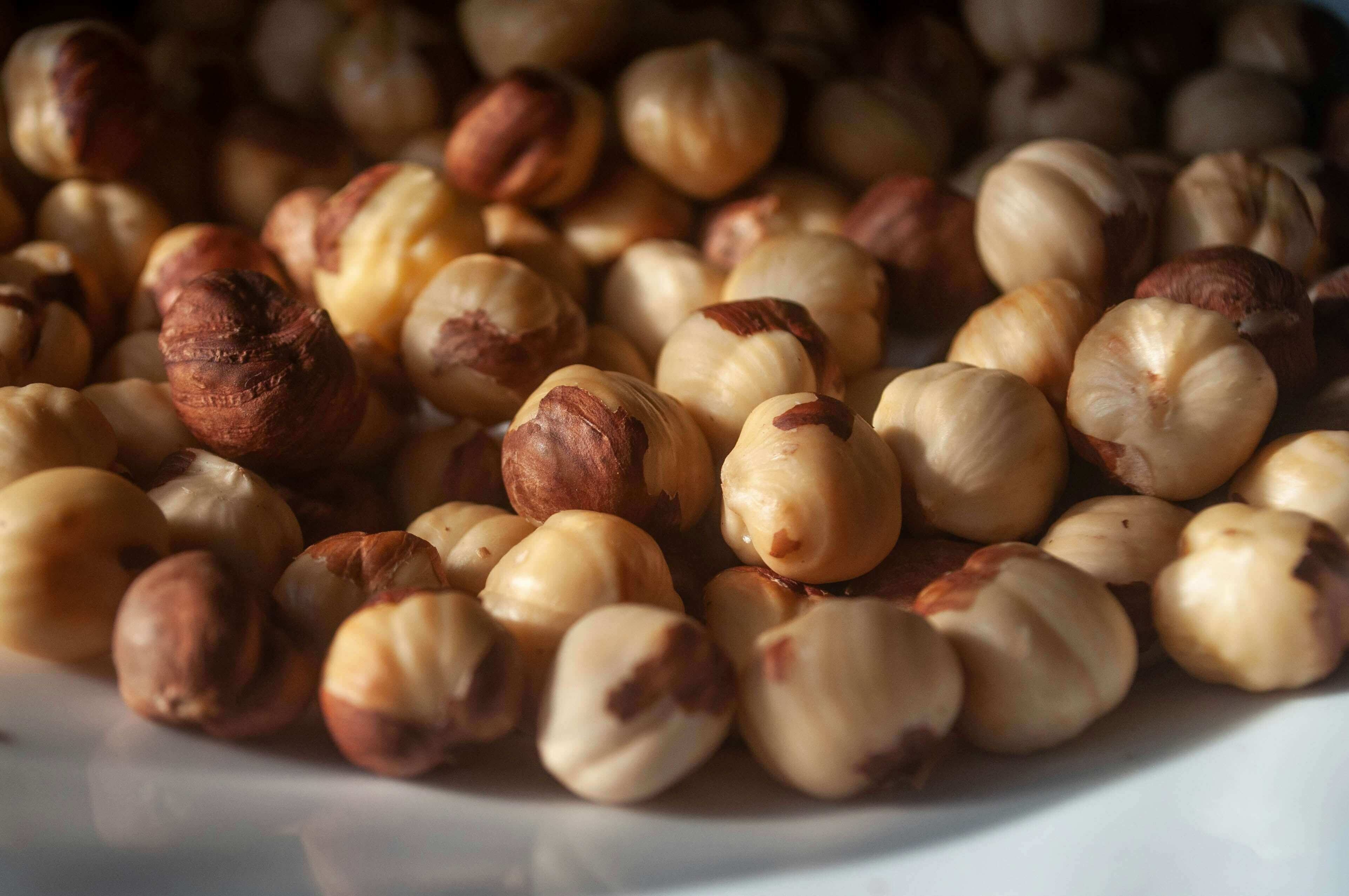
The global demand for hazelnuts continues to rise, driven by the growth of confectionery, bakery, and healthy snack markets. As consumption increases, so does the importance of quality control. Hazelnut processors face mounting pressure to deliver ...
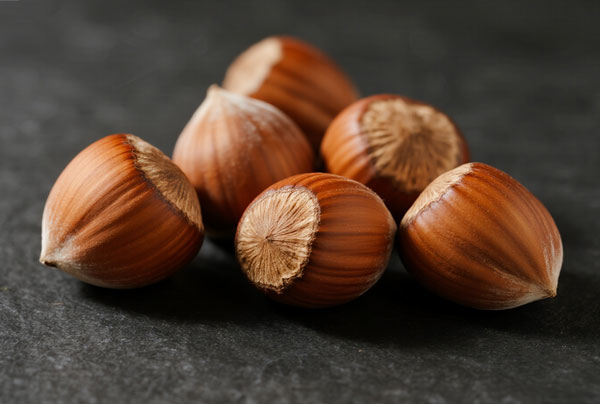
Hazelnuts are widely used in confectionery, bakery, and snacks, where product quality directly affects market value. However, hazelnut processing often faces serious challenges, such as pest infestation, seasonal labor shortages, and inconsistent m...
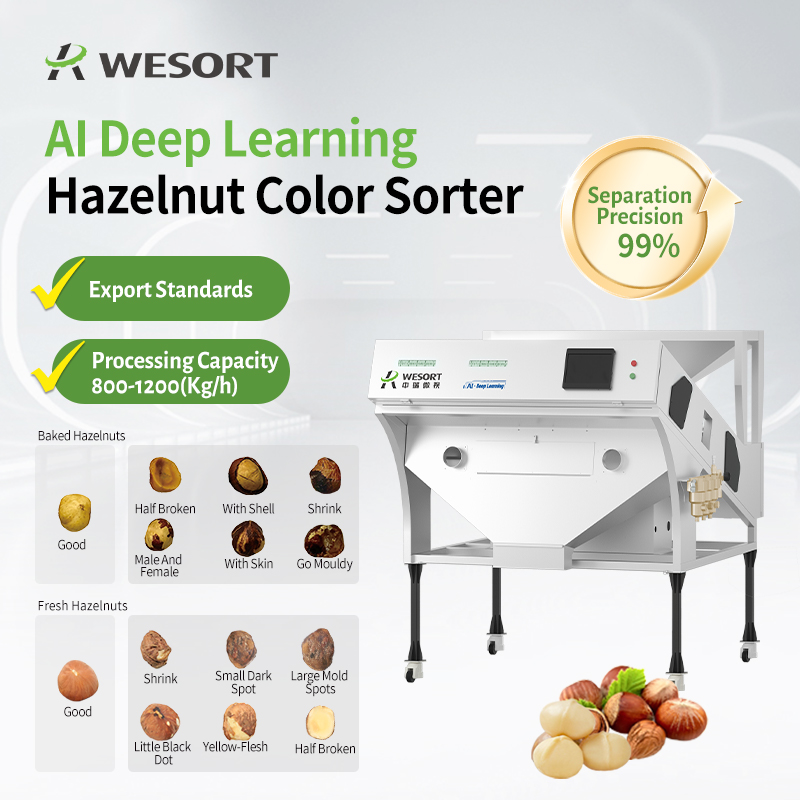
Hazelnut is the nut of the hazel and therefore includes any of the nuts deriving from species of the genus Corylus, especially the nuts of the species Corylus avellana. It is also known as cobnut or filbert nut according to species. A cob is roughl...
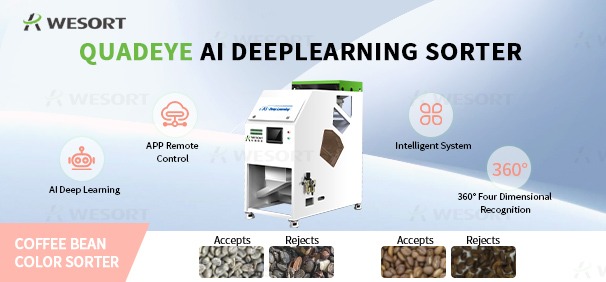
When you enjoy a smooth cup of coffee, you may not realize how much work goes into ensuring its purity and flavor. From harvest to cup, every step matters—and one of the most critical yet often overlooked stages is coffee bean sorting. Common Cof...
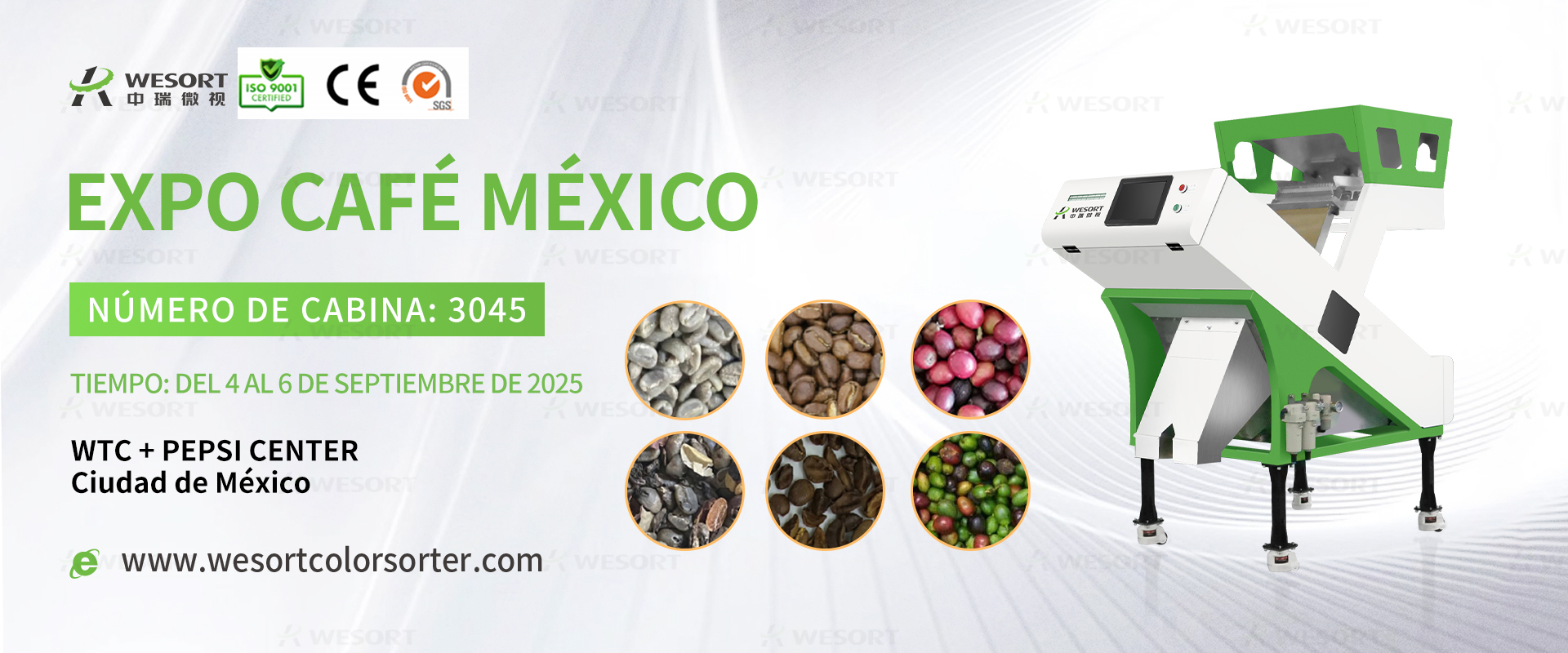
Dear Coffee Industry Partners, The Mexican Coffee Shop Expo 2025 is just around the corner—and WESORT , a leader in intelligent sorting technology, will be there to showcase our core solution for coffee processors: Coffee Bean Color Sorters. Mark...
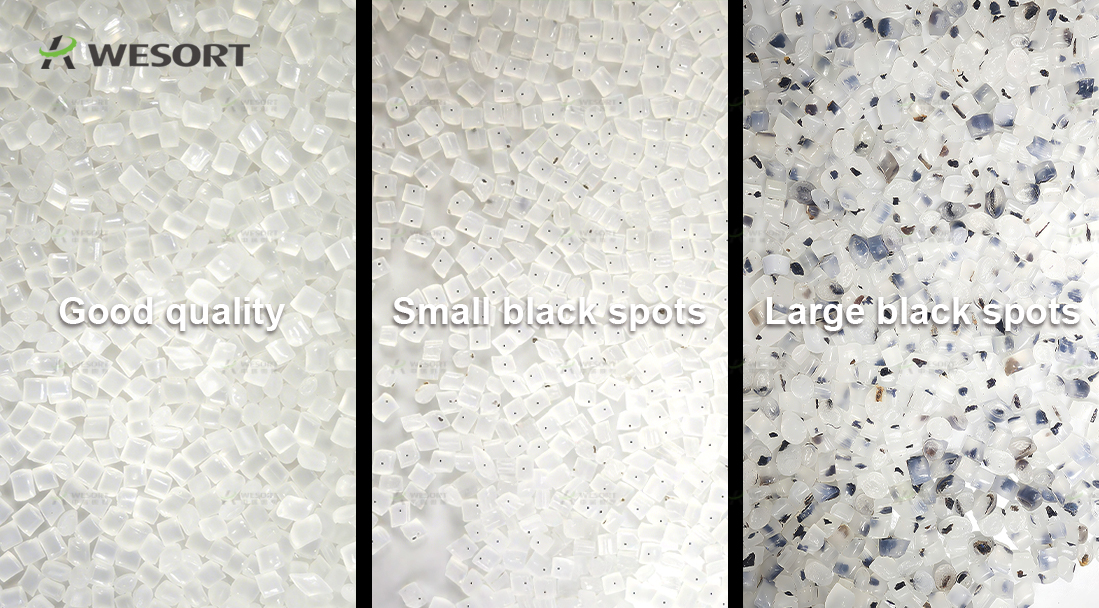
In the plastic pellet production process, color purity often directly determines the product's selling price and market competitiveness. Especially for transparent, white, or light-colored plastic pellets, even tiny black specks can affect the appe...

In modern agriculture, food processing, and recycling, quality control plays a vital role. This is where an optical sorter comes in. Many buyers often ask: What is an optical sorter? What does it do? How much does it cost? And how is WESORT optical...

In the coffee industry, the quality of the final cup often depends on the smallest details during processing. One crucial step is removing defective beans, foreign materials, and color inconsistencies. This is where a coffee bean color sorter plays...

Coffee processing is a complex and meticulous task that involves several stages to transform raw coffee cherries into the high-quality beans we enjoy in our morning brew. One crucial step in this process is the sorting of coffee beans based on thei...

In the world of walnut processing, even the smallest imperfection can significantly impact product quality, market price, and brand reputation. Mold, insect damage, broken pieces, or inconsistent color are common defects that reduce the value of wa...

From green bean exporters to specialty coffee roasters, every producer faces the same challenge: how to remove defects efficiently while protecting valuable beans. Problems such as mold, fermentation damage, insect bites, black beans, broken beans,...

To meet the growing demand for premium and specialty coffee, sorting accuracy must go beyond traditional color-based systems. The QuadEye 360 AI Coffee Bean Sorter, developed by WESORT, represents the next generation of intelligent coffee bean so...

Dear friend, If you are attending World of Coffee Dubai 2026. we would like to invite you to visit WESORT. We will showcase our QuadEye 360 AI Coffee Bean Sorter, featuring 360° four-side inspection, AI deep learning models, near-zero breakage,...

Meta Description: Looking for the top hazelnut sorting machine manufacturer? WESORT offers advanced hazelnut color sorters with AI deep learning to efficiently remove defects, pests, and foreign materials. Boost your hazelnut processing efficienc...